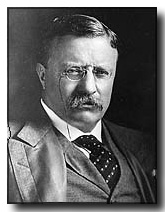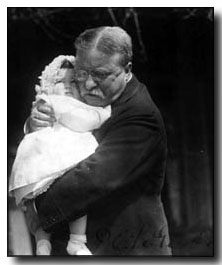Teddy Roosevelts Passion for Family Life Outranked Every Other
- WILLIAM MATTOX JR.
Teddy Roosevelt a big-game hunter who pioneered the National Park system, built the Panama Canal, and won the Nobel Prize for Peace packed "more into one life than any ten men of average metabolism." What many commentators fail to notice about this man of noble passions is that his greatest passion was his family.
 |
Teddy
Roosevelt (1858-1919) |
For example, in 1904, when TR was running for re-election, he wrote his sister, Bamie, that he would be deeply disappointed if he lost his bid to remain in the White House, but that infinitely more important to him was the fact that he had "the happiest home life of any man whom I have ever known."
Similarly, after winning re-election with an overwhelming majority, TR wrote his son, Kermit, that "it was a great comfort to feel, all during the last days when affairs looked doubtful, that no matter how things came out, the really important thing was the lovely life I have with mother and with you children, and that compared to this home life, everything else was of very small importance from the standpoint of happiness."
His father's son
Teddy Roosevelt's whole-hearted devotion to family life had its roots in his own upbringing.
The second of four children, Roosevelt grew up in a remarkably affectionate and close-knit family. His mother, Mittie, called their uninhibited embraces "melts." And his father, Theodore Roosevelt, Sr., was in Teddy's eyes, "the ideal man."
Writing from Harvard soon after he entered college, TR told his father, "I do not think there is a fellow in college who has a family that loves him as much as you all do me, and I am sure that there is no one who has a father who is also his best and most intimate friend as you are mine."
Many years later, long after his parents had died, their profound influence on Roosevelt's life was still evident. Recalling Christmas celebrations from his childhood that were "literally delirious joy," TR said he tried to "reproduce them exactly for my own children." And just as his father had once offered his children a chance to examine everything that came out of his pockets at the end of the day, Roosevelt also invited his children to enjoy all of the trinkets and treasures he would remove from his pockets and place in a "ditty box" at day's end.
When Roosevelt was in his third year at Harvard, he met a young lady named Alice Hathaway Lee, who stole his heart away. Writing in his journal during their courtship, TR observed, "She is so marvelously sweet, and pure and lovable and pretty that I seem to love her more and more every time I see her, though I love her so much now that I really can not love her more."
On the day Alice accepted his proposal of marriage, Roosevelt wrote, The aim of my whole life shall be to make her happy and to shield her and guard her from every trial, and, oh, how I shall cherish my sweet queen. How she, so pure and sweet and beautiful, can think of marrying me, I cannot understand, but I praise and thank God it is so."
Alice and Theodore were married in the fall of 1880. But their love affair ended tragically four years later when Alice contracted Bright's disease during childbirth and died in TR's arms less than 24 hours after his beloved mother had succumbed to typhoid fever.
Their deaths devastated TR, and ultimately prompted him to forsake New York for the Dakota territory, where he would fill his days hunting elk, buffalo and other wild game.
In time TR returned to New York and married a long-time family friend, Edith Kermit Carow, who became his life long companion and the mother of his five youngest children: Ted, Kermit, Ethel, Archie and Quentin.
The wildest scramble
In 1901, when Theodore Roosevelt at age 42 became the youngest man to serve as president of the United States, his family set off on "the wildest scramble" in the history of the White House. "The children, hearty and full of spirits, immediately proceeded to cut loose," a veteran White House usher remembered. They found big tin trays in the White House kitchen in which they slid down staircases. They transformed garbage can lids into shields and wooden sticks into swords for playing war. Young Quentin once smuggled the family's Shetland pony into the mansion, up an elevator, and into the sick room to cheer his ailing older brother, Archie.
"The Roosevelts were the liveliest family to descend on the poor old White House in its entire history," reported biographer Joan Patterson Kerr.
The ringleader of many White House shenanigans was none other than the president himself. During his time at 1600 Pennsylvania Avenue, TR got involved in many pillow fights, wrestling matches and "wild romps," plus games of hide-and-go seek and "very big bear" with the kids.
One night, 15 minutes before a diplomatic dinner, President Roosevelt went upstairs to check on his two youngest boys. When he opened the door to their room, TR reported, "the two small persons in pink tommies instantly raced for the bed and threw themselves on it with ecstatic conviction that a romp was going to begin. I did not have the heart to disappoint them, and the result was that my shirt got so mussed that I had to change it."
On another occasion, the president was riding down the street in his carriage when he spied Quentin and some of his playmates riding in the rear-facing seat of a trolley car. Seeking to goad the president, the boys began making some of the most hideous faces imaginable.
According to Earle Looker, a long time friend of Quentin, the president responded in kind, "and produced some terrifying and extraordinary grimaces, which were witnessed by [adult] passengers on the car.."
Character ed
While President Roosevelt had no intention of hastening his children out of childhood, he did devote considerable energy to preparing them for the serious pursuits of life. A voracious reader, TR instilled in each of his kids a love of books that prompted one White House aide to describe the whole family as "fiends when it came to reading."
Eldest daughter Alice, who convinced her father to let her loose in his library instead of being sent away to formal school, described TR's library as an "enchanting" place with "an enormous variety of books." While she enjoyed digging into his books and dutifully reporting to him each day about what she was learning she enjoyed even more having her father describe, as only he could, various events in history.
"American history was made vivid and thrilling to us by Father," Alice recalled. "He used to tell us of Daniel Boone and Davy Crockett, and the Alamo; of the Naval War of 1812; of Hampton Roads and the Battle of Mobile Bay, of Bull Run, and of Gettysburg. He made them sound like sagas."
In addition to these impromptu history lessons, TR also cultivated in his children a love of poetry. According to one biographer, "The children used to gather in his room while he was dressing for dinner, and to entertain them Father would recite poetry."
Kermit would say later, "I think we children got much of our love for the outdoor life not only from actual example, but from the poetry that Father taught us."
TR was even more concerned about his children's moral development. In a letter to Kermit, in which he praised his son's interest in playing football, TR wrote, "I would rather have a boy of mine stand high in his studies than high in athletics, but I would a great deal rather have him show true manliness of character than show either intellectual or physical prowess."
Part of their moral development involved teaching the children not to consider themselves better than others. When a society matron once asked one of the Roosevelt boys, "How do you get along with those common boys?" TR's son responded, "I don't know what you mean. My father says there are only four kinds of boys, good boys and bad boys; tall boys and short boys, and that's all the kind of boys there are."
Some moral lessons were learned the hard way. On one memorable occasion, TR took Quentin to the woodshed for lying about an unexcused absence from school.
On another occasion when one of Quentin's spitballs missed its target and hit his teacher the president was so concerned that his son had not made a proper apology that he paid an unannounced visit to the school to offer the teacher a public apology (complete with a bouquet of flowers) in front of Quentin's entire class. Not only did TR want to make amends, but he felt it was important to model for his youngest how to make an appropriate apology.
The right priorities
 |
Roosevelt's devotion to family transcended his private life; it also shaped his public pronouncements.
"The tasks connected with the home are the fundamental tasks of humanity," Roosevelt once noted. "When home ties are loosened; when men and women cease to regard a worthy family life, with all its duties fully performed, and all its responsibilities lived up to, as the best life worth living; then evil days for the [nation] are at hand."
One afternoon, President Roosevelt was meeting with a distinguished gentleman on the subject of Cuban reciprocity, when along came a knock on the door accompanied by a small voice announcing that it was after four o'clock.
"By Jove," TR responded, "so it is! Why didn't you call me sooner? One of you boys get my rifle."
Apologizing to his visitor, the president excused himself. "We'll finish this talk some other time," he said. "I promised the boys I'd go shooting with them at four o'clock, and I never keep the boys waiting." If such actions seem genuinely remark able by today's standards, they genuinely reflect Teddy Roosevelt's outlook on life.
"There are many kinds of success in life worth having," he wrote. "It is exceedingly, interesting and attractive to be a successful business man, or railroad. man, or farmer, or a successful lawyer or doctor; or a writer, or a President, or a ranchman, or the colonel of a fighting regiment, or to kill grizzly bears and lions.
"But for unflagging interest and enjoyment, a household of children, if things go reasonably well, certainly makes all other forms of success and achievement lose their importance by comparison."
 This is Meaghen Gonzalez, Editor of CERC. I hope you appreciated this piece. We curate these articles especially for believers like you.
This is Meaghen Gonzalez, Editor of CERC. I hope you appreciated this piece. We curate these articles especially for believers like you.
Please show your appreciation by making a $3 donation. CERC is entirely reader supported.

Acknowledgement
William R. Mattox, Jr. "Teddy Roosevelt's Passion for Family Life Outranked Every Other." The Medorian Summer 2000.


